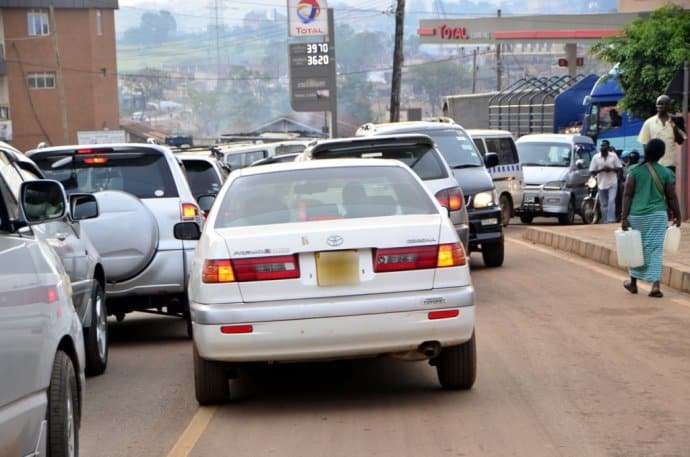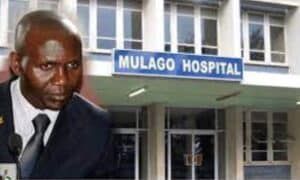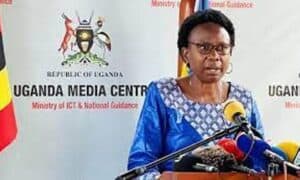Car owners and motorcyclists will have to part with Shs735,000 for the digital number plates, this publication has established.
This has, however, drawn criticism from transporters, who said this will lead to an increase in transport fares.
The number plates will be rolled out in July while government vehicles were expected to switch on March 1.
In a February 15 circular, Mr Ramadhan Ggoobi, the permanent secretary of the Ministry of Finance, Planning and Economic Development and Secretary to the Treasury, said: “Registration of new as well as replacement of all old government of Uganda number plates for vehicles and motorcycles will each cost Shs735,000 or $200.”
Mr Ggoobi said the government has concluded the process of gazetting the Traffic and Road Safety Regulations 2022 and under statutory instruments number 49, the registration of the new number plates, with enhanced and stronger security identification features, will kick off effective July 21.
He asked the accounting officers to budget for fresh registration of all government vehicles and motorcycles under their supervision.
“Accounting officers are advised to make adequate provisions under the item for vehicle maintenance to cater for the cost of new registration and the change of the existing number plates for both motor vehicles and motorcycles in their respective votes,” he said.
Uganda is estimated to have close to 2.4 million vehicles and more than 1.4 million motorcycles and if each of them is registered afresh, the government will rake in up to Shs2.8 trillion.
Details of how the plan will be rolled out are scanty. The government had earlier indicated that it would start with about 1,000 to 1,500 of its cars before opening it up to the rest of the public.
When contacted yesterday, Mr Winston Katushabe, the Commissioner of Transport Regulation and Safety at the Ministry of Works and Transport, said he was out of office and could not respond to our inquiries.
He referred us to Mr Waiswa Bageya, the permanent secretary of the Works ministry, and Ms Susan Kataike, the ministry’s principal public relations officer.
While Mr Bageya did not respond to our repeated calls, Ms Kataike said all is set for the rollout. She said Uganda Revenue Authority (URA) is expected to collect the proceeds from the new number plates and remit the funds to the consolidated accounts.
She added that by law, URA is charged with collecting all the revenue in the country and that this new digital number plate installation is not an exception.
“This registration will follow the driver licensing system, whereby Uganda Revenue Authority will collect the money and remit it to the consolidated account. The auditor general will audit the accounts and after that government will know how to pay the company. The money is not going directly to the company,” Ms Kataike said.
Asked how many vehicles the government is targeting and the timelines for phasing out the old number plates, Ms Kataike said she was not aware. She also did not reveal the deadline for all motorists to migrate to the new digital number plates.
Mr Fred Byamukama, the State minister for Transport, did not respond to our repeated calls.
Mr Francis Musa Ecweru, the State minister for Works, said the project is being directly handled by Gen Edward Katumba Wamala, the Minister of Works and Transport, who has all the information.
However, Gen Katumba was locked in a Cabinet meeting by press time.
The government imposes a 25 percent Import Duty tax, 18 percent Value Added Tax, six percent Withholding Tax, 20 percent Environmental levy, Infrastructure Levy, and Car Registration Fees.
Other overhead costs include third-party motor insurance and tax on fuel.
When calculating the taxes on the vehicles, the government looks at the type of car, seating capacity, year of manufacture, engine capacity, cost insurance and freight tax invoices, and gross weight in kilogrammes.
Transporters react
The move, however irked the transporters. The transporters, under the Amalgamated Transport and General Workers’ Union, accused the government of being insensitive to the rising cost of public transport in the country.
Mr David Musoke, the secretary of the union, said it is wrong for the government to add another cost on transport when Ugandans are still grappling with the rising cost of living.
“Any addition of Shs10 on fuel will increase transport cost by Shs500 on public transport. Already the costs are high and when you add the cost of digital number plates, I don’t know how much that will impact [us], but you can see that the situation is worrying,” he said.
Mr Musoke said the government should think of saving Ugandans instead of condemning them to perpetual poverty.
“Just like they did with the national identity cards, they could register people for maybe nine months and give them free number plates and then those who fail to register during that period are charged,” he said.
He added: “When you look at the commercial cyclists in Kampala, only five percent have the right class of permit, while another five percent are using the wrong class and the remaining have no permits. What will happen with this digital number plates?”
Mr Musoke further said: “I am not against this innovation because we are already in digital economy, but you also need to be mindful of the cost implication on both the owners and the resultant effects on the passengers.”
Background
Government in July 2021 signed an agreement with Russian company M/s Joint Stock Company Global Security to provide the country with number plates that can be digitally tracked.
The new system involves mounting tracking GPS chips in all automobiles in the country at the owner’s expense, and re-registration of all vehicles, motorcycles, and boats.
Dubbed the Intelligent Transport Management System (ITMS)—digital monitoring and tracking system of motor vehicles and motorcycles in the country, government had initially planned cover all government vehicles in March this year, but has since pushed it to July this year.
In 2021, during the State-of-the-Nation address at Kololo Independence Grounds, President Museveni said he had instructed the Works and Security ministries to install the digital number plates so that criminals who use vehicles and motorcycles can be tracked in real time and arrested. He issued the directive after attempted assassination of the former Chief of Defence Forces, Gen Katumba Wamala, where his daughter and driver died in June the same year.
“The cameras I put in place did their work. As you saw the killers were running from one area to the other area. These wonderful camera managers think that their gadgets are only for storing videos for forensic analysis as part of the post-mortem of the operation. Yes, the cameras are for forensic but also for [alarm] while the crime is going on. In addition to the cameras, our security leaders have been working on my directive of installing digital monitors on all vehicles, all bodabodas, and all boats on the lake. This will make it easy to know which motorcycle, car or boat was at this point at this time,” Mr Museveni said.
However, Mr David Musoke, the secretary of the Amalgamated Transport and General Workers’ Union, yesterday said the digital number plates will never solve the crime issue. He said other countries have already digitised but still face high crime rates.
“Take for example South Africa that has already digital number plates, it has very high crime rates in urban areas, so this one in Uganda will not even solve the problem. Maybe they are thinking of generating more revenue, but in this case they must consider the plight of people who are struggling,” he said.
Source: Monitor












